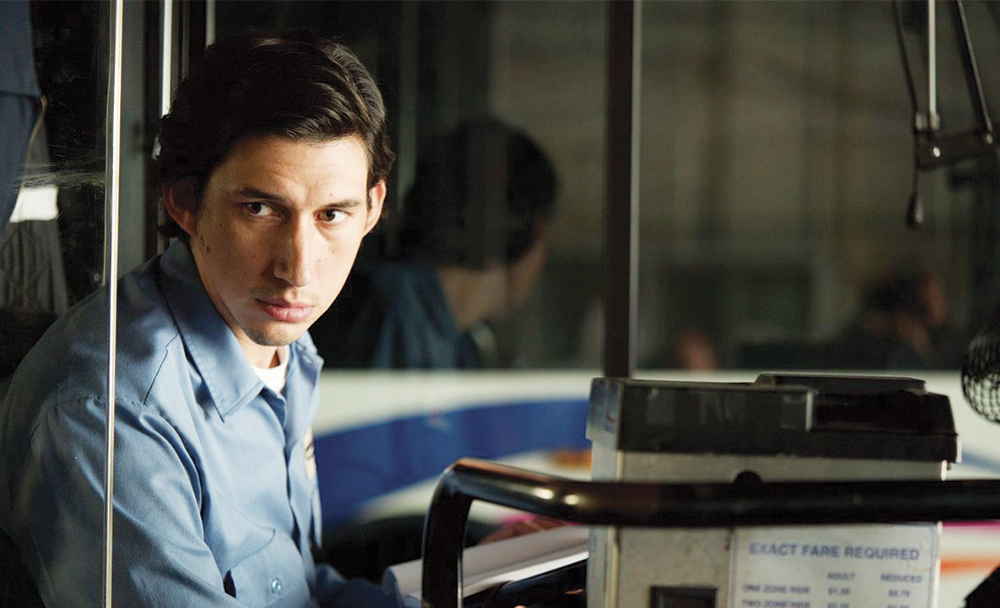 (5 / 5)
(5 / 5)
Films do not have to be dark in order to be profound. Sometimes the human condition can, in fact, be hopeful.
No better is this demonstrated than in Paterson, Jim Jarmusch’s heartfelt ode to blue-collar life in all its ordinary extraordinariness.
The eponymous Paterson is a bus driver who just so happens to live in Paterson, New Jersey. Played by Adam Driver, Paterson is a quiet, reflective man who lives with his kooky wife Laura (Golshifteh Farahani) and their pet bulldog Marvin.
Set against the passionately interested Laura — who one moment aspires to being a famous baker, the next a country music singer — he could seem self-serious, were it not for the bemused twinkle in his eyes and a certain wry cast to Driver’s handsomely protuberant features.
Always attentive to the world around him, Paterson carries with him a notepad in which he periodically writes poetry over the course of the day. The poems are held up to us, appearing on the screen in cursive, narrated to us by Driver himself. Written by Ron Padgett, and inspired by the likes of William Carlos Williams, Paterson’s favorite poet and fellow New Jersey native, they are objectively good — “We have plenty of matches in our house/We keep them on hand always” — and we are privileged to watch them develop; often over the course of a single day.
From his waking up at roughly the same time each morning (6:15, give or take) to his returning home to an always-crooked mailbox (no matter how many times he straightens it), Jarmusch infuses every detail of his protagonist’s routine with rare insight and lightness of touch. Sharp and yet gentle, close enough for comfort, varied enough to retain interest, you leave the cinema feeling like you have got to know him intimately.
A brief encounter with a talented ten-year-old poet manages more complexity than most film’s manage in their entire run-times. Paterson’s clear admiration for this unassuming wunderkind, his ever-so-slight envy and insecurity about how this reflects on him, is conveyed entirely, in all its emotional minutiae, by Driver. It is an astonishingly subtle performance.
Another less confident film would feel the need to introduce “stakes” into the proceedings — Paterson and Laura are certainly a very different couple, for instance; surely there must be some tension there? Paterson, though, is instead content to focus, to crystallise in glorious detail, on what Rupert Brooke’s called “the long littleness of life”.
Even so, the film is elided with an almost indeterminable sense of foreboding. We know, attuned as we are to both life and cinema, that something must happen: things that are loved can and must be lost.
Might Marvin, of whom he is not overly fond, be “dog-jacked”, as a car-load of socially-minded wide-boys suggest, from outside the bar where Paterson ties him up each evening? A sequence set here, with proud Patersonian (Barry Shabaka Henley) and his wall of photos (Lou Costello, Iggy Pop), plays so neatly with time and space — a simple focus pull, the tick of a chess clock — it could be the geometry of the universe at work.
Equally, could something happen to that book of poetry before Paterson gets a chance to photo-copy it, as he has promised Laura he will, this coming weekend? The prospect of someone dying, or coming to serious harm, never enters our minds.
There will be no catastrophic bus crash, even if Paterson is occasionally distracted, which is not to say mechanical failure is on the cards. The bus is just a mechanism for Paterson to observe. None of the passengers — sweet-natured teenage anarchists, lovelorn self-deluding blokes, black kids discussing “Hurricane” Carter (another local luminary), twin old ladies (a motif) — will change his life.
When “tragedy” does come, the event is quietly devastating in its total expectedness and yet its unpredictability. Life can be like that sometimes.
Minimalist, naturalistic, sublimely modernist, Paterson is a film that truly embodies the figure at its heart. Sure, its blue-collar romanticism comes courtesy of the indie director de rigeur, whose last film was about hipster vampires, and the film’s adulation comes at the cost of Laura, whom it seems to regard as well-meaning kook.
Nevertheless, the film is extraordinary in its depiction of the ordinary. It’s a work of art that to discuss is to diminish — it may even, you heard it here first, be my film of 2016.
